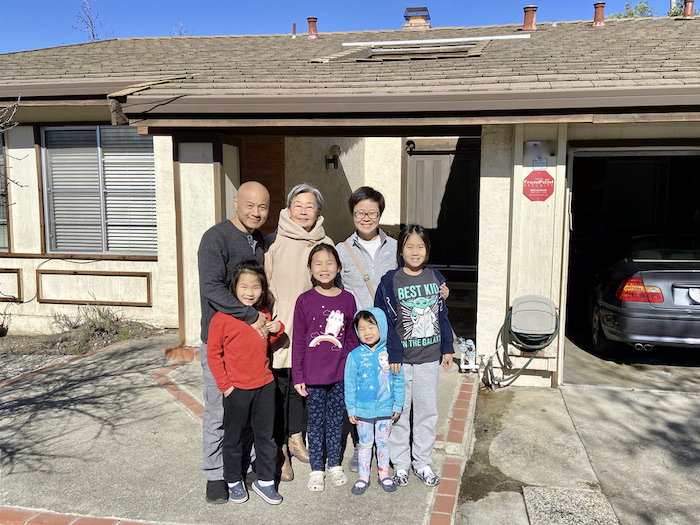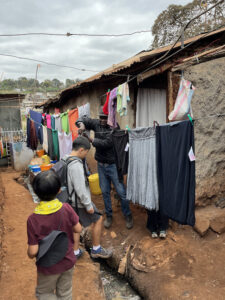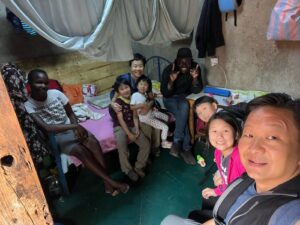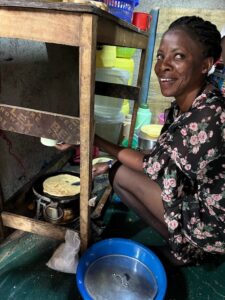Since we began planning our trip and researching the Airbnb’s that we would stay in, I have been thinking deeply about the concept of “home”. In my life, I have lived in about 10 different places and at various times, referred to each of those places as “home”. During our trip, I anticipate having to redefine and recreate the idea of “home” many times as we travel from place to place. If we stick with our plan of staying in about 5 different Airbnb’s in each country, over the course of a year, we will have created “home” 70 times.
To some, home might be a place like a city or town or a specific childhood home. To me, home is a feeling. It is where all of us, each of us, feels safe, comfortable and relaxed. We discussed the idea of home briefly one morning and I was pleasantly surprised that my kids felt the same way. I asked each of them the question, “What is home?” and this is how they answered.
A few days ago, we visited an area of Nairobi called Kibera. Kibera is often called “the largest slum in Africa” and it is the third largest slum in the world. About 250,000 people live in Kibera and residents survive on less than a few US dollars a day. There is no running water and electricity is stolen from the power companies by enterprising individuals and sold to residents through illegal and dangerous makeshift power lines. My kids have never been to any place remotely like Kibera and I wanted them to see it and for us to see it together. We found a highly-rated tour guide through Airbnb Experiences. Erick was born and lives in Kibera and runs a social enterprise that promotes education for children in his neighborhood.
The highlight of the tour was visiting Erick’s home. It was a 3-meter by 3-meter wood structure with mud walls and a roof made of corrugated tin. It was sparsely furnished with a bed, a table, a few plastic chairs and a kitchen area. The room was divided in half by a curtain which Erick explained separated the bedroom area from the living area. He and his wife slept on the bed and his two children slept on mats on the floor. At the time, they had a house guest from Mombasa, his wife’s sister, who also slept on a mat. They use a shared public toilet a few minute’s walk away and each time, they must pay 10 Kenya shillings (about US$ 0.07). They prepare their meals on a narrow table by the door and underneath the table is an electric hot plate for cooking. While we were in their home, Erick’s sister-in-law was preparing chapati for lunch and shared some with us. Because there is no running water in Kibera, residents use 10 liter water tanks to transport water for daily use like drinking, cooking, washing dishes and clothes. Apart from furniture, the water tanks occupy the most room in the home. Erick’s family has very few personal belongings.
I felt thankful that my family was allowed such an intimate glimpse into Erick’s life and home. We were welcomed by his wife and children and offered some simple food as guests in their home. Rich or poor, the dynamics of hospitality in one’s home are the same.
Visiting Erick’s home greatly humbled us and made an impression on my understanding of “home”. It goes without saying that we have enjoyed infinitely more opportunities and luxuries compared to Erick and his family. The homes we are accustomed to bear scant resemblance to the ones in Kibera. However, for both of our families, home is where we can be at ease with our families and guests to share meals, conversation and lay our heads down peacefully at night
While Erick’s and our circumstances are vastly different, I imagine most parents share the same sentiment – Home is where our children feel safe, comfortable, relaxed and happy. In our specific situation, in order for our children to maintain the stamina, enthusiasm and discipline for living and learning in a constantly changing and unfamiliar environment, we need a home where they can recharge and relax at the end of each day. Having a good home, wherever we are, is a stabilizing factor that we consider a top priority and we are willing to dedicate a significant part of our budget to securing this.
When we think about a good home, for our family, this is what we have in mind.
– Sufficient space – To keep our sanity, we need enough space where we can be together or be apart. Ideally, the space has a large living room with lots of comfy seating and a dining area with at least six seats. The dining table is important for sharing meals and also for learning time where we need to spread out with our ipads, notebooks and stationery. In terms of bedrooms, we prefer to have 3 bedrooms and at least 2 bathrooms.
– A good kitchen – We are a family who loves to cook together. RY is a budding chef and all of the kids are eager to help in the kitchen. We plan on having many of our meals at home so we need a good and well-equipped kitchen. This will help us to keep costs down and establish a feeling of routine and familiarity.
– Family-friendly area – In order for kids to be happy and healthy, they need somewhere to play safely. When selecting Airbnb’s, I always try to find a home with something that can give the kids some physical release and an opportunity for unstructured play such as a pool, trampoline, playground or nearby park, beach or other open area. This is not always possible, but I keep it at the top of my mind.
– Quality over location – Particularly in urban areas, the better the location, the more expensive the place. Given a fixed budget, I choose quality, safety, size and features of the Airbnb over location. This means that we may need to spend more time getting to and from activities and attractions using Uber or public transportation. Having a good home, especially in an unfamiliar city, is far more important to us than convenience to touring. Plus, it gives us a chance to experience the place as a local with more contact with the mundane aspects of daily life like grocery shopping, visiting neighborhood parks and interacting with local people going about their lives.
– Creature comforts – To create a sense of familiarity and continuity, each of our children were encouraged to bring some items that might be considered unnecessary, but that they love. Each of them brought one or more cherished stuffed animals that they can hug to sleep at night. Each also brought some special toys that give them the feeling of home. RY and DY brought along their Switch and some transformers. AY and EY brought their miniature world dolls and toys that can occupy them for hours regardless of where they are. We also packed a few sets of toys for EY such as play food so she can set up her restaurant, hair accessories for her to set up her hair salon and a bag full of plastic sea creatures that are the source of endless story-telling entertainment. Although these things take up coveted packing space, we know they are important to the emotional wellbeing of the kids.
As our trip progresses, we will be able to see if our concept of home also evolves. We are adaptable and resilient, but will we always yearn for the home that we have left behind?
What is “home” to you? Please share in the comments below.
Author
-

Song is the mother of four children. She and her family have stepped away from it all and in September 2023, began traveling the world while homeschooling. Song is an ABC (American born Chinese) and has an undergraduate degree from Cornell and an MBA from Harvard. She is an entrepreneur and an educator. Her hobbies include learning, traveling, reading, cooking and baking, and being with children.





I also ask Emily this question,her answer is: home is where we come back and we feel belong to:)
Hi Minyan and Emily! Thank you for replying. What a great answer – indeed, home is where we feel like we belong.